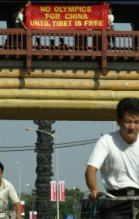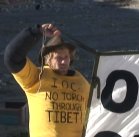The Occupiers’ Burden
 This editorial, currently featured on Guerrilla News Network (GNN), was written by one Tibet’s greatest supporters and a former board member of Students for a Free Tibet.
This editorial, currently featured on Guerrilla News Network (GNN), was written by one Tibet’s greatest supporters and a former board member of Students for a Free Tibet.
Is the Dalai Lama’s pacifist stance helping or hurting the Tibetan cause?
Over the last 19 years since the last significant pro-independence protests in Tibet, the Chinese government has weathered a growing Tibet movement active, for the most part until this week, outside of the country’s borders. They’ve taken the occasional wrist slaps from world leaders over their rights policies in Tibet, suffered through the negative publicity of two damning Hollywood films ( Kundun and Seven Years in Tibet) and high profile concerts, dealt with the annoyance of protests whenever and wherever their leaders travel abroad, and grumbled loudly over the Dalai Lama’s continued popularity among world citizens and world governments.
But though they may grumble about the Dalai Lama and gripe about the relatively harmless – though consistent – nonviolent movement that Tibetans and Tibetan rights advocates have waged since 1989, Beijing has also benefited greatly from the Dalai Lama’s pacifist stance. For if anything over the last two decades has kept the Tibetan population from doing exactly what they did this week, it has been the Dalai Lama’s steadfast devotion to nonviolence and his insistence that his people maintain a similar moral high ground. If, for all these years, the Dalai Lama had been fomenting a violent uprising, Tibet – for better or worse – would be a very different place.
They say that life happens on the level of events, not words, and what has been for the most part a war of words for the last two decades has just been eclipsed by action. Propaganda has been replaced by reality. The elaborately constructed PRC notion that Tibetans are content under Chinese rule has been smashed; by a single rioter’s stone.
Right now in Tibet, Chinese tanks patrol the streets and loudspeakers blare Orwellian slogans urging Tibetans to ‘know friends from enemies’ and – in true Spanish-inquisition-style justice — to turn themselves in for ‘mercy’. In a clear violation of everything the Geneva Convention has to say about the treatment of prisoners, FOX News and the Times (UK) are reporting truckloads of Tibetan prisoners paraded through Lhasa with their heads forcibly bowed as a warning to other potential troublemakers to show restraint.
Certainly appeals for calm in any violent situation are warranted. As a lifelong Tibet activist — who saw firsthand the Chinese government’s violent reaction to the 1989 protests in Lhasa — I have been a champion of moderation and nonviolence for a very, very long time. But it speaks volumes to me that the first significant attention the Tibetan cause has received in 20 years has come not on the heels of the concerts I organized or as a result of the years of nonviolent protest the Tibetan people have undertaken, but as a result of violent uprising. After a painful stasis in which Tibetans inside and outside of Tibet have tolerated a political deep freeze that has deadlocked their nation, they are fed up, and tempers are boiling over.
The Dalai Lama — as is his spiritual requirement — has joined the voices for restraint. In fact, as a sign of his obvious frustration at being caught between the cronies in Beijing who accuse him of instigating dissent and his own people who accuse him of not doing enough, he has threatened to ‘resign.’ In his subsequent urgings for his people to remain nonviolent, he has stated that violence is not the solution, and even if 1,000 Tibetans die in violent uprising, it will do no good.
But the burden of restraint should not be on Tibetans, who have acted with restraint for over 50 years. Tibetans have, except for the very rare times when passions and frustrations flare, followed His Holiness’s lead, bit their tongues, and suffered the humiliation of colonization with nobility and grace. These Tibetans, who finally, after years of brutal occupation, are acting violently, are no mindless hooligans. It takes a lot to make a Tibetan pick up a stone and throw it at another person. A Tibetan, raised steeped in Buddhist morality and with a sense of absolute obedience to the wishes and words of the Dalai Lama, has to go through a pretty deep moral struggle in order to pick up that rock, as it represents not only rising up against their occupier, but rising up against their own cultural fabric of Buddhist nonviolence as well. They do not do this lightly.
And while no one wants to see violence, while no one benefits from the beating of random shopkeepers, the burden of restraint must be on the occupying force. Until China allows for free expression of views, they will continue to see Tibetans throwing rocks. As long as they continue to respond like five-year-old bullies – mercilessly berating the Dalai Lama, responding to basic expressions of free speech with soldiers and tanks, not allowing the true Tibet story to be told to any members of the press, they will have a big problem on their hands. As Nelson Mandela said, in the case of enduring conflicts between occupier and occupied, the occupier has the prime moral responsibility. The Chinese have set the terms of the occupation. It is their mess to figure out, and figure it out they ultimately will have to do. In the mean time, Tibetans should act exactly as they see fit. They are the occupied people, and are under no obligation to treat their occupier with a respect which they have not been granted themselves.
The only question that remains is if Beijing will finally be sensible and take a constructive approach to solving a situation that won’t go away, or if they will continue to act like the neighborhood bully, in which case they can probably expect a lot more stones.
GNN contributor Josh Schrei is a producer, writer, and nonprofit strategist living in New York City. Josh has closely followed the situation on the ground in Tibet for 19 years, writing numerous articles on the subject that have been widely published. Josh served as Campaigns Coordinator for the Milarepa Fund from 1996 – 2001 and on the Board of Students for a Free Tibet from 1999 – 2004.
Posted: March 21st, 2008 under News.
translate: ![]()
![]()
![]()
![]()
![]()
![]()
![]()
![]()
![]()
Comments: 5
Comments
Comment from edith
Time: March 21, 2008, 7:31 am
I have tried to make a correct french translation of this text, but my english is not perfect (far from it), so you would better make it check by somebody.
Good luck.
Edith
Comment from Gubbi
Time: March 21, 2008, 9:05 am
It is unfortunate that the current world attention towards Tibet situation is attributed to the violent uprising and that Dalai Lama’s insistence on non-violence is seen as a deterrent.
If anything, the violence by Tibetans has only helped China justify its harsh clampdown. Whole world sided with the Tibetans when thousands poured out for a peaceful protest march and China’s response to such a peaceful protest was rightly condemned everywhere. Once Tibetans started violence, the support has dwindled a little. It becomes difficult for other countries to support such violent uprisings. And it has somewhat shattered the image of Tibetans being peaceful. Human rights are violated when people are not allowed freedom of speech, but when stones are thrown at public property, China can justify their response.
Two wrongs do not make a right, it only worsens the situation…. leaves unforgettable scars for generations.
Dalai Lama has insisted rightly on non-violence, the basis of which is not to assume a “moral high ground” but as follows:
Tibet and China are neighbors and are predisposed to live along side each other. Having hatred towards each other instead of respect will make it impossible for either to live in peace. History from all over the world demonstrates the complicated, never ending situations neighboring countries get into when they have separated through hatred. People never come to trust the other, economy and trade is doomed, never ending border issues…. all of which make it difficult to solve with hatred than with respect for one another.
>>>>> The elaborately constructed PRC notion that Tibetans are content under Chinese rule has been smashed; by a single rioter’s stone.
Comment from Gubbi
Time: March 21, 2008, 9:19 am
>>>>> Tibetans have, except for the very rare times when passions and frustrations flare, followed His Holiness’s lead, bit their tongues, and suffered the humiliation of colonization with nobility and grace. >>>> And while no one wants to see violence, while no one benefits from the beating of random shopkeepers, the burden of restraint must be on the occupying force. >>>> It is their mess to figure out, and figure it out they ultimately will have to do. In the mean time, Tibetans should act exactly as they see fit. They are the occupied people, and are under no obligation to treat their occupier with a respect which they have not been granted themselves.
Comment from tenzin
Time: March 22, 2008, 9:24 am
Well, it seems that only things that draw media attentions is the violence and vandalism. And these are the very thing tha hogs the limelight and press coverage..After the violent action taken by monks and lay tibetans in Lhasa 19 years ago.. Whatever actions(NON-VIOLENT) taken by the tibetan refugees around the world to draw worlds attention…never got such coverage as it is getting right now! Infact indian media never care to cover the actions..Only thing that they give a sapce is a pretty face of tibetan demonstrator…as if they have taken the policy of indian govt. Still the indain govt..MEA’s statement just released read india at currently not requires to change its policy…or something to that effect…Isnt it pathetic !
Since media wants to cover violence….it is correct approach that tibetans have taken…if von-violent means dont get the attention i would say violent means certainly does…but still the UNO has done nothing and not come forward…
What are they (UNO) waiting for? Cant they issue sanction against China..as they did to Myanmer few months back…Sweets and sugar-coated words are flowing from few countries and reknown peoples but…they are just words..which i dont think is effective enough…
IT is not surprise! that Economic dependent and FDI has stop UNO…to even condem violent crackdown by chinese army…What is the worth of such organisations …if they cant check such brutal repression. Does they want china to kill remaining tibetan people?….
Comment from Tian
Time: March 22, 2008, 5:21 pm
Hey, I posted this response on another video thread here. Just in case people didn’t see it, I will post another copy of it here. It’s my idea of a solution to the problem. Comments are appreciated, especially from Tibetan separatists. Thanks!
In the past, Chinese emperors have always adopted a policy of limited overlordship to Tibet. Or, in better terms, a patron to the religious elite there. Perhaps we should try to reinstate this relationship. China should move its militaristic arms and the majority of its government out of Tibet (only Tibet, not Gansu or Sichuan) and establish Tibet as a sort of “religious theme park” unique only to China where the entire region of Tibet is more autonomous and its govt is focused on religion and the traditional “blissful” way of life. The Dalai Llama is to be reinstated and will play a pivotal role in the politics there. The Tibetans will be able to practice their religion as they see fit as long as Tibet stays politically and militaristically neutral and they accept China as their overlord and military protector. Tibet must acknowledge itself as a part of China on paper and in international circles. Hans must be allowed limited tourist visas to this “religious holy land” to purify and cleanse themselves of capitalist sins which is wrecking havoc to the the nation as a whole. But they cannot live there permanently without an official approval from the Tibetan/Llama government. All foreign visiting visas are to be handled by Tibetan and Chinese govts. jointly.
Finally, a part of Tibet’s annual operating budget will be supported by the Chinese state in response, the Tibetan govt. headed by the supreme Dalai Llama must pledge unwaivering political allegiance and provide steadfast religious counseling and support to China, and most importantly Tibet must vow militaristic, political, and diplomatic neutrality.
I think this would create the best outcome for both Tibetans and Hans. Tibetans need their quiet, graceful bliss while the Han majority are in serious need of religious guidance….right now.










Write a comment